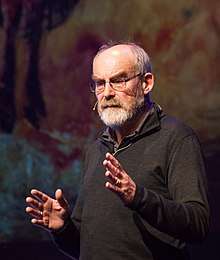Dave Snowden
David John Snowden (born 1954) is a Welsh management consultant and researcher in the field of knowledge management and the application of complexity science. Known for the development of the Cynefin framework,[1] Snowden is the founder and chief scientific officer of Cognitive Edge, a Singapore-based management-consulting firm specializing in complexity and sensemaking.[2]
David J. Snowden | |
|---|---|
 Dave Snowden, 2016 | |
| Born | David John Snowden 1954 |
| Nationality | Welsh |
| Education | BA (philosophy), University of Lancaster, 1975 MBA, Middlesex Polytechnic, 1985 |
| Occupation | Management consultant |
| Employer | Cognitive Edge Pte Ltd, Singapore |
| Known for | Cynefin framework |
Education
Snowden graduated in 1975 with a BA (Hons) in philosophy from the University of Lancaster, where he was a member of County College.[3] He obtained an MBA in 1985 from Middlesex Polytechnic.[4]
Career
Snowden worked for Data Sciences Ltd from 1984 until January 1997.[4] The company was acquired by IBM in 1996.[5] The following year Snowden set up IBM Global Services's Knowledge and Differentiation Programme.[6]
While at IBM Snowden researched the importance of storytelling within organizations, particularly in relation to expressing tacit knowledge.[7][8][9] In 2000 he became European director of the company's Institute for Knowledge Management,[4] and in 2002 he founded the IBM Cynefin Centre for Organisational Complexity.[10] During this period he led a team that developed the Cynefin framework, a decision-making tool.[11][12][13]
Snowden left IBM in 2004 and a year later founded Cognitive Edge Pte Ltd, a management-consulting firm based in Singapore.[14] As of 2016 he is an associate professor extraordinaire at the University of Stellenbosch Business School,[15] and an honorary professor in the school of psychology at Bangor University.[16]
Works
Snowden is the author of several articles and book chapters on the Cynefin framework, the development of narrative as a research method, and the role of complexity in sensemaking.[2] In 2008 he and co-author Mary E. Boone won an "Outstanding Practitioner-Oriented Publication in OB" award from the Academy of Management's Organizational Behavior division for a Harvard Business Review article on Cynefin.[17][18] In 2008–2009 he wrote a column for KMWorld on trends in technology, "Everything is fragmented".[19] He is an editor-in-chief of the journal Emergence: Complexity and Organization.[20]
References
- Bob Williams, Richard Hummelbrunner, Systems Concepts in Action: A Practitioner's Toolkit, Stanford, CA: Stanford University Press, 2010, 163–164.
- "Biography of David Snowden" (PDF). cognitive-edge.com, courtesy of Athabasca University. 2008. Retrieved 23 February 2010.
- "Interview with Dave Snowden" Archived 8 May 2016 at the Wayback Machine, Lancaster University Enterprise Centre, 2016
- "Dave Snowden", LinkedIn. Retrieved 28 November 2016.
- "IBM to acquire Data Sciences", New Straits Times, 7 March 1996.
- "Knowledge Management: Managing a New Age of Uncertainty" (PDF). Alba Executive Education Programs. 2000. p. 5. Archived from the original (PDF) on 20 December 2016.
- Patti Anklam, Net Work, Burlington, MA: Butterworth-Heinemann, 2007, 182.
- Alicia Juarrero, "Cauality and Explanation", in Peter Allen, Steve Maguire, Bill McKelvey (eds.), The SAGE Handbook of Complexity and Management, London: SAGE Publishing, 2011, 161–162.
- Dave Snowden, "Storytelling and Other Organic Tools for Chief Knowledge Officers and Chief Learning Officers", in Dede Bonner (ed.), Leading Knowledge Management and Learning, Alexandria, VA: American Society for Training and Development, 2000, 237–252.
- "The Cynefin Centre for Organisational Complexity", IBM Global Services, archived 14 June 2002.
- David Snowden, "Complex Acts of Knowing: Paradox and Descriptive Self Awareness", Journal of Knowledge Management, 6(2), May 2002, 100–111. doi:10.1108/13673270210424639
- Cynthia F. Kurtz, David J. Snowden, "The new dynamics of strategy: Sense-making in a complex and complicated world", IBM Systems Journal, 42(3), 2003, 462–483. doi:10.1147/sj.423.0462
- Thomas Quiggin, "Interview with Mr. Dave Snowden of Cognitive Edge", Seeing the Invisible: National Security Intelligence in an Uncertain Age, Singapore: World Scientific, 2007, 212.
- "Cognitive Edge Pte Ltd", Bloomberg. Retrieved 28 November 2016.
- "Associate professors extraordinaire", University of Stellenbosch Business School.
- "Meet the team", Bangor University.
- "Outstanding Practitioner-Oriented Publication in OB", obweb.org.
- David J. Snowden, Mary E. Boone, "A Leader’s Framework for Decision Making", Harvard Business Review, November 2007.
- Dave Snowden (2009). "Everything is fragmented". KMWorld.
- "Review Board", Emergence: Complexity and Organization.
External links
- List of articles by Dave Snowden, archived 17 January 2012.